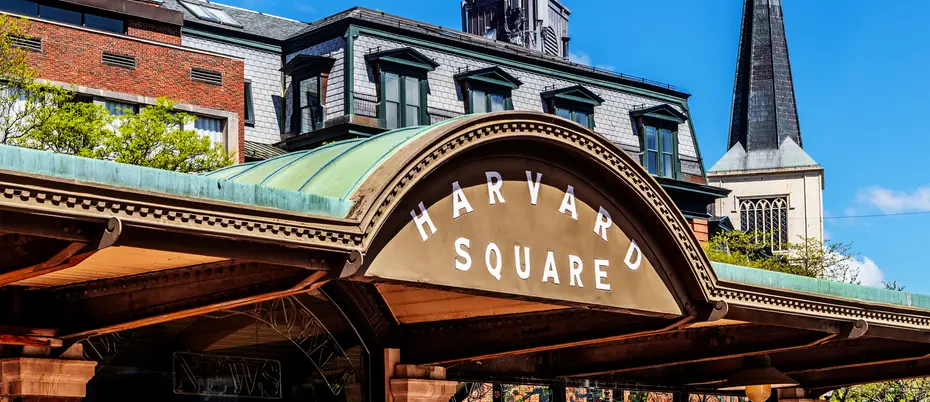Behavioral Science
MIT Sloan professor’s new book chronicles the crazy, complicated love story of Harvard Square — and downtowns across America
Author Catherine J. Turco explores the attachments we form to the markets in our lives
CAMBRIDGE, MA, December 5, 2022 – Why do so many of us feel like our local Main Streets and downtowns are not what they used to be? This question lies at the heart of a new book, Harvard Square: A Love Story (Columbia University Press), by, an economic sociologist at the MIT Sloan School of Management.
Using the case of Harvard Square, Turco explores the role of street-level markets in our daily lives, why we fall in love with them, and why we so often struggle with changes in them. Located in Cambridge, MA, directly adjacent to Harvard University, “the Square” — as it is affectionately called by locals — has for years served as a commercial center to residents and students in the area. Harvard Square: A Love Story dives deeply into the history of this one beloved marketplace, revealing, in the process, the complicated love affair Americans everywhere have long had with their own downtowns.
Turco’s initial impetus for the project was personal. She came to know and love the Harvard Square marketplace as a young girl, visiting her grandfather at his work as a Massachusetts Bay Transit Authority bus driver whose route took him through the Square each day, and having breakfast there with her father every Sunday morning. She went on to attend Harvard University, from which she earned a BA in economics, an MBA, and PhD in sociology. Years later, having moved back to Harvard Square, she began to worry that the vibrant marketplace she recalled from her youth wasn’t what it used to be, and she set out to understand why. Turco’s historical research soon unearthed a surprising finding, however: For hundreds of years, it seemed, one generation after another had lamented that Harvard Square “wasn’t what it used to be.”
“At that point, I realized I had an even bigger puzzle to tackle,” Turco says. “I had to understand why Harvard Square had always been not what it used to be — and what that meant, more generally, about our relationship with markets and market change.”
With an eye for forensic detail, Turco conducts “autopsies” of dearly departed Harvard Square businesses to reveal the variety of market forces constantly creating change at the street level. She also dives into the most heated moments in Harvard Square’s history to investigate why certain changes have provoked extreme public outrage and why others have not.
Turco continually invites readers to shift their vantage point so as to see things from the often-contrasting perspectives of residents, activists, business owners, and landlords, all of whom forge their own deep attachments to the marketplace. Readers meet compelling characters, past and present, such as the early 20th century businessmen who bonded over scotch and cigars to found the Harvard Square Business Association; a feisty, frugal landlady who became one of the Square’s most powerful property owners by the mid-1900s; a local neighborhood group calling itself the Harvard Square Defense Fund that fought real estate developers throughout the 1980s and ‘90s; and a local businesswoman who in recent decades strove to keep her shop afloat through personal tragedy, the rise of Amazon, and a globalizing property market that sent her rent soaring.
Harvard Square: A Love Story transcends existing economic and sociological theories to offer a powerful new lens for understanding markets—one that exposes the myriad (often hidden) ways in which our markets lend our lives stability and instability, security and insecurity. The book ultimately argues that our relationship with the markets in our lives is so complicated—and can provoke so much love and outrage—because, at its heart, it is about our relationship with ourselves and one another, how we come together and how we come apart.
Starting with the 17th century open-air market that sat atop the sloping hill off the banks of the Charles River and carrying readers up through the height of the pandemic, Turco reveals what a central, and centrally important, social institution street-level markets have always been in American life. The book concludes by raising a set of tough questions we must ask ourselves in our particular historical moment of streaming content, delivery on demand, and zoom meetings: What relationship do we want to have with our street-level markets going forward?
“Do we want to recommit to our dear old friend the marketplace?” Turco asks at the end. “Do we want to meet one another for coffee only in the Metaverse? Do we want the Amazon marketplace to be the only marketplace we visit? How much of our social and economic lives do we want to spend separated from one another by our screens instead of meeting in person in our town centers and neighborhood markets?”
About the MIT Sloan School of Management
The MIT Sloan School of Management is where smart, independent leaders come together to solve problems, create new organizations, and improve the world. Learn more at mitsloan.mit.edu.




